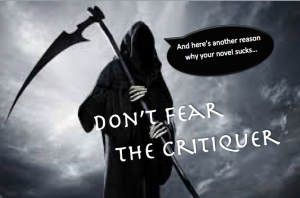 Despite what you may think, the folks critiquing your manuscript are not the sickle-wielding grim reaper come to bury your manuscript, although for the uninitiated it can be Hell.
Despite what you may think, the folks critiquing your manuscript are not the sickle-wielding grim reaper come to bury your manuscript, although for the uninitiated it can be Hell.
I paid—yes, paid—for critiques from industry professionals at writers conferences and also paid a professional writer for a manuscript critique/editorial report. Those critiques were worth every penny…er…dollar. Of course, there are lots of writers groups willing to do it for free. Just make sure those critiquing have cred, and by that I mean they have had a traditionally published novel or are in the industry ( agent, editor ). Suzy Sunshine’s gushing over your manuscript won’t be helpful in the long run.
Critiques, especially for the novice, are invaluable! However, you have to put on your big boy pants and be willing to take advice and learn from your mistakes. Easier said than done!
9 Critique Tips
- Fresh eyes on your manuscript baby are soooo important. What we think we wrote is often not conveyed on paper. I see this with my students. “That’s not what I meant,” they say. “But that’s what you wrote,” I reply.
- Be prepared to get beat up. You need a tough skin in this business. Rejection is the norm. Get used to it.
- Don’t bring a first draft. They tend to be crap. Bring your very best revised and revised and revised again version.
- If it’s an informal critique TAKE NOTES. You should be scribbling down everything said. I critique my students formal essays and college personal statements, and I’m surprised ( and a bit miffed ) when they don’t write down my suggestions. You know, you’re not going to remember everything when you get home.
- Don’t argue. Arguing with the person taking the time to give feedback just shows your unwillingness to get better or take advice. Also remember that people have lots of different opinions.
- Honesty vs Flattery: Some folks are forthright and brusque. They don’t hold any punches. Others hide their criticisms with flattery and insincerity. They don’t want to dash your dreams and crush your soul. Learn to see the benefit of both. Dream killers are great for strengthening your resolve to write better. And cheerleaders motivate you to keep trying. It’s all good.
- If it’s a written critique, read, weep, then sit on it for a few days. Don’t lash out on social media. Digest the comments and suggestions slowly. Inhale. Exhale. Take one matter at a time.
- Don’t ask or sign up for a critique is you have no intention of improving. That’s a waste of the reader’s time and energy. We learn while we write. We learn while we revise. We learn while we edit. We learn when a pro points out problems.
- Even if you have to fake it, portray a positive can-do attitude during the critique. “Handles criticism with grace and humor” is one of my favorite things to write on a student’s letter of recommendation. Learn to laugh at your mistakes. Cry at home later.
Related posts: Readin’ & Writin’














